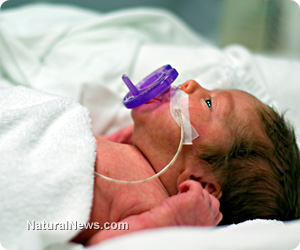
Talking to premature babies may help them develop faster while in the the hospital
Saturday, February 22, 2014 by: L.J. Devon, Staff Writer
Tags: premature babies, talking, hospital
- Newly released JFK files reveal Pentagon's role in creating Lyme disease and covid in the same lab
- DEADLY DECEPTION: How COVID vaccines increased mortality rates and why authorities hid the truth
- CDC finally halts $11 billion COVID funding scam as health officials admit the ‘pandemic’ was a fraud
- The hidden dangers in your kitchen: How cooking methods impact diabetes, cancer and aging
- GAIN-OF-FUNCTION CAT-BIRD-FLU now on the rise as nearly a dozen cats in Colorado "test positive" for Bird Flu due to contaminated cat food
- Here are TEN all-natural ways to protect your garden without using harmful chemicals
- Trump's greatest betrayal so far: Accelerating Middle East wars, silencing dissent, and serving Zionist masters
- Why you should think twice before buying mainstream toothpaste formulas
- “Endgame: The Hidden Agenda 21” unveils a world of conspiracy and control
- Ginseng's hidden anti-aging power: How compound K is rewriting the rules of skincare
- ATTENTION PRESIDENT TRUMP: Please WITHDRAW your nomination of Dr. Susan Monarez for CDC Director as she is a VAX FANATIC and TOXIC JAB ZEALOT
- Was JFK's assassination orchestrated by a CIA double agent? New evidence points to James Angleton as the “architect”
- Home gardening for preppers: A beginner's guide to growing your own food
- Senate Democrats deny censorship industrial complex existed, defend government's role in silencing dissent
- Record honeybee deaths devastate U.S. agriculture, pesticides under scrutiny
- Paper or plastic? The environmental deception behind bag bans
- Scientists demand FDA withdraw mRNA COVID vaccines amid contamination and gene therapy concerns
- Lab leak confirmed? Boris Johnson's stunning reversal on COVID origins sparks global debate
- Newly released JFK files reveal Pentagon's role in creating Lyme disease and covid in the same lab
- Elon Musk: Aliens could be here on Earth RIGHT NOW
- Festive flavors: The sweet history, nutritional profile and health benefits of pecan pie
- Trump reverses course on Gaza plan, says “nobody is expelling Palestinians”
- Reclaim your health: How midlife exercise reverses years of inactivity
- Big Pharma's $8 Billion bribery scheme exposed: how doctors are pushed to prescribe junk science, not heal
- Boys are back in town: Trump’s patriotic alpha crew takes the wheel while toxic females ride in the backseat
- EPA advisor admits the agency is funneling billions to climate groups ahead of Trump’s return to White House
- Space war brewing? Russia threatens to destroy Starlink satellites
- Survival 101: Effective EMF blocking techniques
- A lack of integrity in Academia: Harvard professor found GUILTY of fraudulent research to promote CRT theory
- Mike Adams Sermon 66: God will DESTROY ISRAEL for its wickedness
- 5 Simple steps to boost your brainpower: How to strengthen executive function in a distracted world
- Rep. Nancy Mace introduces bill to ban biological males from female facilities on federal property
- Sugarcane extract superior to cholesterol-lowering drugs?
- WHO focusing more on policing speech about public health and implementing global surveillance systems
- Pilots report mysterious lights 'moving at extreme speeds' across Oregon skies
- Dr. Mike Yeadon releases 15-minute testimony - WATCH - about genocidal intent of COVID “vaccines”
- EPA advisor admits the agency is funneling billions to climate groups ahead of Trump’s return to White House
- The Health Ranger releases “Vaccine Zombie” song and music video, using AI-animated zombies for the music video
- California's social media censorship law struck down: A victory for free speech or a threat to online safety?
- Dr. Mike Yeadon releases 15-minute testimony - WATCH - about genocidal intent of COVID “vaccines”
- The pandemic as a tool for INDOCTRINATION: Understanding “The Indoctrinated Brain” by Dr. Michael Nehls
- Florida takes a stand: DeSantis proposes permanent ban on mRNA vaccine mandates
- Mike Adams releases country western hit single: Goin’ Back in Time is Comin’ Home
- Mike Adams releases music poetry sensation: A Child of God
- “Why we influenced the 2020 elections”: Facebook files reveal the coordinated effort to bury the Hunter Biden laptop story
- RFK Jr. clears key hurdle: Sen. Susan Collins backs controversial HHS nominee, signaling a new era for health policy
- Unpacking the Lies That We’ve Been Fed – new song and music video released by Mike Adams, the Health Ranger
- Mike Adams releases new song and music video: Nothing More Disgusting Than a Globalist
- Newly released JFK files reveal Pentagon's role in creating Lyme disease and covid in the same lab
- Congratulations to the FULLY UNVACCINATED as you resisted the COVID-19 PROPAGANDA MACHINE fueled by over $100 BILLION
- Michigan sheriff announces criminal investigation into 2020 election crimes, Dominion Voting Systems
- Israeli soldiers accused of even more torture and abuse in the West Bank
- Migrants are taking advantage of recent hurricanes to scam residents and loot their homes
- House Intelligence Committee calls for the ARREST and PROSECUTION of Dr. Anthony Fauci
- Red Cross issues warning to stop blood plasma donations from vaccinated people
- Scientists confirm: GENIUS brain function can be spontaneously unleashed in humans without any apparent cause
- EPA advisor admits the agency is funneling billions to climate groups ahead of Trump’s return to White House
- HYSSOP: What research reveals about the health benefits of this ancient holy herb
- Two containers with completed ballots fall out of truck in Florida
- Fully vaccinated about to see “tsunami” of illness and death, warns virologist
- Global leaders unite to clamp down on “misinformation” with UN-backed Cascais Declaration
- BREAKING: 2025 NDAA authorizes mandatory military draft of WOMEN across America… as Pentagon pursues global NUCLEAR war with both Russia and China at the same time
- Michael Yon warns of a ZIONIST TAKEOVER in Trump’s second administration
- BOMBSHELL: DNA testing kits are a SCAM to develop ethnic-specific bioweapons
- Ozempic and Wegovy weight loss drugs are injectable LIZARD VENOM PEPTIDES that may unleash a devastating wave of organ failure… side effects align with symptoms of SNAKE BITES
- Israeli soldiers accused of even more torture and abuse in the West Bank
- These 13 countries just signed an agreement to engineer a global FAMINE by destroying food supply
- NASA admits that climate change occurs because of changes in Earth’s solar orbit, and NOT because of SUVs and fossil fuels
- RFK Jr. clears key hurdle: Sen. Susan Collins backs controversial HHS nominee, signaling a new era for health policy
- Sermon 30: How Jesus reveals Caesar’s FAKE CURRENCY and FALSE AUTHORITY
- Coriander seeds: Ancient medicine backed by modern science
- Arizona officials claim Maricopa County needs 10-13 days to tabulate results of the election
Lack of communication with premature babies adversely affects their development
New evidence suggests that premature babies develop faster if they are talked to during this crucial time. This evidence from the Warner Alpert Medical School of Brown University finds that babies who are exposed to talking in the NICU go on to score higher on developmental tests which include communication, motor skills and thinking."This is certainly a remarkable, easy to implement and cost effective intervention," said Dr. Betty Vohr from the Warren Alpert Medical School of Brown University.
When Vohr and colleagues began to study deeper into prenatal development, they realized that babies can benefit developmentally by just hearing their mother's voice inside the womb.
But premature babies, who are born before 32 weeks of gestation, may be stymied, because they do not develop while hearing their mother's voice.
It's important to note that babies who remain in their mother's womb up until the end of pregnancy are possibly exposed to multiple thousands more words than babies born prematurely.
To investigate, Vohr's group recruited 36 families whose babies were born before 32 weeks of pregnancy and were kept in the NICU.
The babies wore recording devices that analyzed room noises and conversation over a 16-hour period. Communication analyses were conducted at 32 and 36 weeks.
For the most part, the premature babies were exposed to more talking at 36 weeks. Some babies only heard 144 words, whereas some were exposed to upwards of 26,000 words.
Vohr and colleagues monitored the premature babies as they developed. At seven and 18 months of age, Bayley-III scores were assigned, which tested and measured the infants' motor, language and thinking skills.
Talking to babies speeds up their thinking development by 20 percent
Vohr and colleagues found that, when adult word count per hour increased, so did the infants' motor and communication skills. For example, they found that the amount of talking that the babies heard at 30 weeks accounted for 12-percent differences in their average language scores, which were measured at seven months of age.Babies who were spoken to more at 36 weeks showed a 26 percent increase in thinking scores at only seven months of age.
At 18 months of age, the babies who heard more adult voices showed communication development score gains of 20 percent!
"To our knowledge, this is the first study showing that early exposure in the NICU of preterm infants to higher numbers of adult words is positively correlated with cognitive and language outcomes after discharge," wrote the researchers.
"I really think that talking to children is a really good thing to do," Dr Heidi Feldman, from Stanford University School of Medicine, added. "Some of us start when our children are in utero. Sometimes our children come when they should still be in utero."
"I think we should pay attention to it, and try to understand it a little bit better and figure out what the causal mechanisms are," she continued, stressing the importance for parents to communicate with their infants in different stages by also touching them gently in safe spots like the earlobe or between the eyebrows.
Sources for this article include:
http://www.dailymail.co.uk
http://pediatrics.aappublications.org
http://science.naturalnews.com
Premature babies at FETCH.news
Get independent news alerts on natural cures, food lab tests, cannabis medicine, science, robotics, drones, privacy and more.
Take Action: Support Natural News by linking to this article from your website
Permalink to this article:
Embed article link: (copy HTML code below):
Reprinting this article:
Non-commercial use OK, cite NaturalNews.com with clickable link.
Follow Natural News on Facebook, Twitter, Google Plus, and Pinterest
Science News & Studies
Medicine News and Information
Food News & Studies
Health News & Studies
Herbs News & Information
Pollution News & Studies
Cancer News & Studies
Climate News & Studies
Survival News & Information
Gear News & Information
News covering technology, stocks, hackers, and more



"Big Tech and mainstream media are constantly trying to silence the independent voices that dare to bring you the truth about toxic food ingredients, dangerous medications and the failed, fraudulent science of the profit-driven medical establishment.
Email is one of the best ways to make sure you stay informed, without the censorship of the tech giants (Google, Apple, Facebook, Twitter, YouTube, etc.). Stay informed and you'll even likely learn information that may help save your own life."
–The Health Ranger, Mike Adams













































